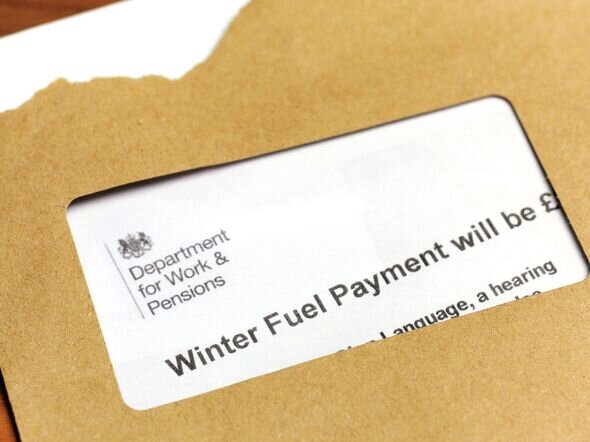Why Keeping Receipts for Tax Purposes is Crucial

Maintaining a meticulous record of receipts is not just a best practice but a necessity for effective tax management. Receipts serve as concrete evidence of your transactions, especially important when you file your Self-Assessment tax return. With a structured system in place, taxpayers can claim all eligible expenses accurately, saving time and potentially reducing tax liabilities.
Moreover, keeping receipts prevents unnecessary complications. In case of an inquiry from HMRC, having a complete archive of your financial transactions ready can significantly ease the audit process. With digital tools and apps, like the Pie Tax App, managing and storing receipts has become seamless, ensuring you never miss out on important evidence for your tax filings.
Ultimately, understanding the importance of receipt management boils down to safeguarding against financial discrepancies, ensuring compliance with tax laws, and optimising your filing process. Taking proactive steps towards organised record-keeping can transform your tax season from a stressful ordeal into a manageable task.
Methods for Storing Receipts
There are several effective approaches to storing receipts to ensure they are always accessible when needed. One popular method is the classic file folders, where each expense type is categorized in separate folders. This physical organisation helps in easy retrieval during tax preparation.
Another efficient method is using digital solutions. By scanning receipts and storing them in cloud-based folders, you can access your records anytime, anywhere. Utilising applications like the Pie Tax App further simplifies this process through automatic categorisation and storage, ensuring your records are up-to-date and secure.


Benefits of Digital Receipts
Shifting to digital receipts offers several advantages over traditional paper receipts. First, it significantly reduces clutter, freeing up physical storage space. Digital records are much easier to organise, search, and retrieve compared to rummaging through stacks of paper.
Additionally, using digital receipts enhances security. Digital storage methods, especially cloud storage, come with encryption and backup features that safeguard your information against loss or damage. Services like the Pie Tax App also enhance this security aspect by providing integrated functionality for sorting and backing up receipts automatically.
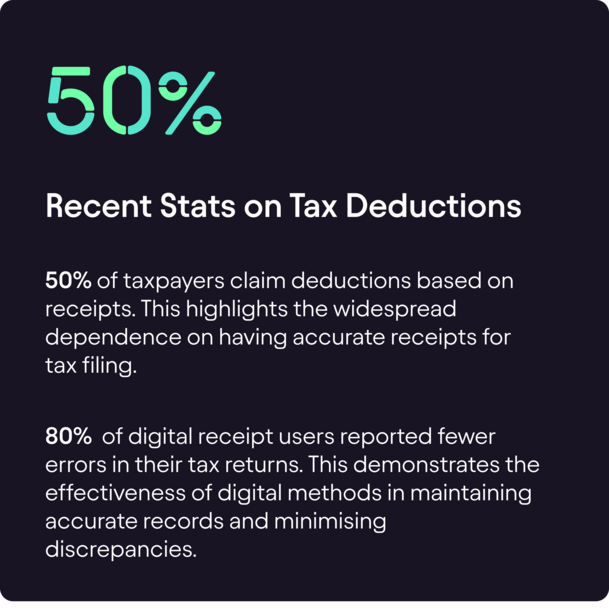
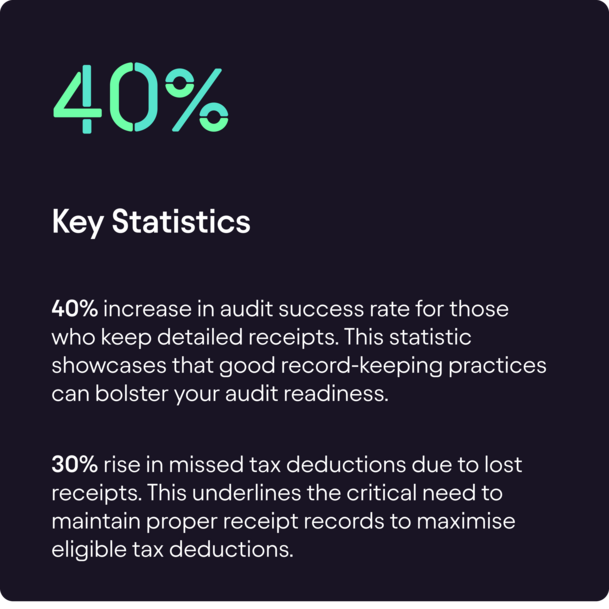

How Long to Keep Receipts
It's essential to know the duration for which you should retain your receipts. HMRC advises that business-related receipts should be kept for at least six years. This period includes some buffer time to account for any potential audits or reviews of your past returns.
However, personal tax receipts, especially those associated with expenditures you plan to claim in your Self-Assessment, should be kept for the duration of the tax year plus another two years. This timeframe ensures you have records readily available during any potential HMRC queries or clarifications.
Types of Receipts to Keep
You should maintain various types of receipts for different expenditures. Business-related expenses, such as office supplies, travel costs, and client entertaining, need to be backed up by receipts to claim appropriate deductions. Equally, personal expenses that you wish to claim under taxable income, such as charitable donations and certain healthcare costs, need to be archived.
Always ensure that your receipts include crucial details such as date, amount, and nature of the transaction. This information is vital for verifying the legitimacy of your claim. The Pie Tax App can help you categorise and store different types of receipts efficiently.

Top Tips for Keeping Receipts

Go Digital Scan your receipts with a mobile app to keep them safe and organised. Digital copies are accepted by HMRC, making filing easier.

Categorise Immediately Sort your receipts into categories like travel, meals, and office supplies. This helps you find them quickly and keeps your records tidy.

Save Originals Keep original receipts in a safe place, even if you have digital copies. HMRC may request the originals for verification during an audit.

Fun Fact
Did you know the concept of receipts dates back to Ancient Egypt? They used stone carvings to document transactions, an interesting predecessor to modern receipt keeping!
Practical Tips for Receipt Storage

Proper receipt storage requires both organisation and accessibility. One practical tip is to develop a consistent naming convention for your digital receipts. Grouping receipts by categories like 'travel', 'office supplies', or 'client meals' can streamline the search process when it's time to file taxes.
Furthermore, make it a routine to digitise physical receipts weekly. Regularly updating your digital storage ensures no receipt goes unfiled. Making good use of tools like the Pie Tax App, which provides reliable storage and categorisation features, can eliminate the hassle of tax season and ensure your records are always complete and easy to locate.
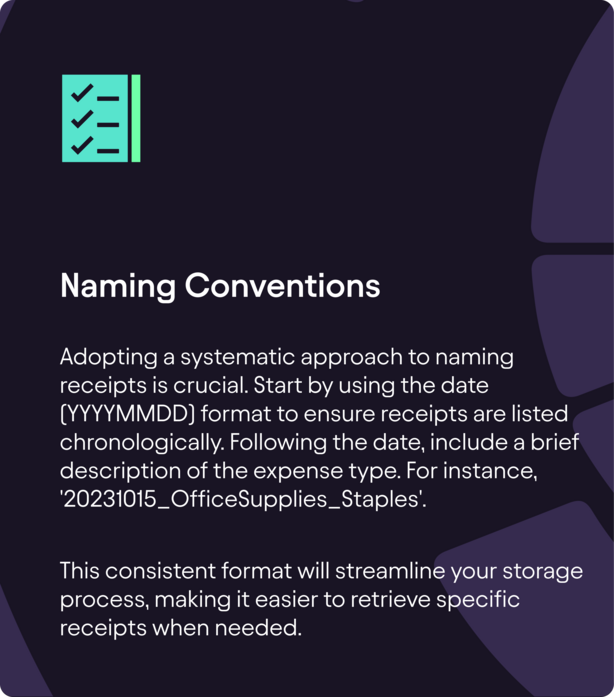
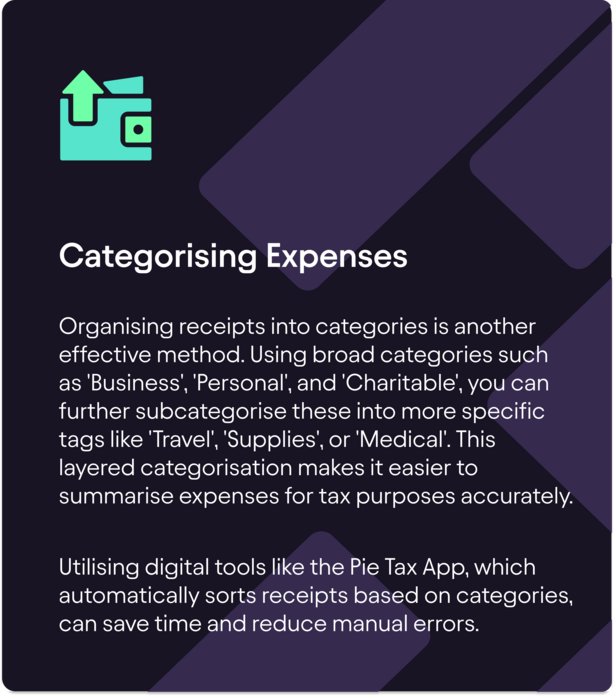
Summary
Proper receipt management is pivotal in ensuring accurate tax filings and maximising deductions. Implementing a system for categorising and storing receipts, whether digitally or traditionally, can save time and mitigate the risk of errors during tax preparation. Utilising tools like the Pie Tax App aids in maintaining an organised archive, enabling seamless access and enhanced security.
Remember, keeping good records not only keeps you in compliance with tax regulations but also simplifies your overall financial management. Start today, organise your receipts, and embrace the stress-free way of handling tax returns by using reliable digital tools like the Pie Tax App.
Frequently Asked Questions
How long should I keep my receipts for tax purposes?
For business-related expenses, HMRC recommends keeping receipts for at least six years. Personal tax receipts should be kept for the tax year plus an additional two years.
Can I use digital receipts for tax filings?
Yes, digital receipts are acceptable for tax filings and audits. Using apps like the Pie Tax App can help you maintain an organised digital archive of your receipts.
What details should a receipt include?
A receipt should include the date of the transaction, the amount, vendor details, and the nature of the expense. This information is crucial for substantiating your claims.
What happens if I lose a receipt?
If you lose a receipt, try to obtain a duplicate from the vendor. If that's not possible, make a note of the transaction details to support your tax claims.
How can the Pie Tax App help with receipt management?
The Pie Tax App provides features for digitising, categorising, and securely storing your receipts. It ensures your records are organised and easily accessible for tax filings.








